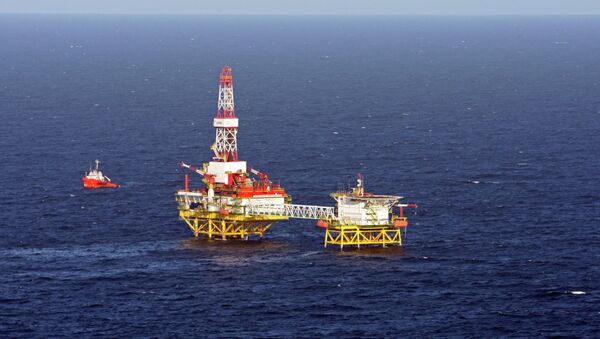MOSCOW, August 21 (RIA Novosti) – US-led sanctions on high-tech exports to Russia cannot hurt its energy production, whereas missed profits threaten to pit European businesses against their own governments, Sergei Pravosudov from Rossiya Segodnya’s Center for International Journalism and Research said.
“The US ban on technology exports to Russia will never stop Russia’s shale oil and gas exploration projects since Russian companies found alternatives to them long ago,” Pravosudov, the director of the Russian National Energy Institute, said.
America’s ban on the sale of equipment used in deep-sea drilling, arctic exploration and shale extraction to Russia would have dealt its energy industry a devastating blow, if it had come a few years earlier, the pundit suggested.
“Now these sanctions are no threat to Russian projects to develop offshore oil and gas reserves as well as extract shale oil. The worst-case scenario would be a minor delay in them reaching full capacity,” Sergei Pravosudov stressed.
The Soviet Union had little expertise in offshore drilling, focusing predominantly on extracting oil and gas from onshore deposits. In the 1990s, American, British, Japanese and Indian companies helped Russia launch its first large-scale shelf-drilling projects, Sakhalin-1 and Sakhalin-2.
In early 2014, Russia’s state-owned oil giant Gazprom Neft hauled in the first batch of oil from the Prirazlomnoye field, 60 km offshore in the Russian Arctic shelf, and did so without any help from Western companies.
As of now, Gazprom purchases 95 percent of its drilling equipment from domestic producers.
“Naturally, both Russian and imported technologies were used in these projects, but now our companies have all that they need. Technologies have been mastered and can now be copied or improved to fit the climate in Russia… In case of an emergency, we can also get help from countries that resisted the sanctions and have experience in deep-water drilling, such as Brazil,” Pravosudov said.
The expert stressed that even American energy majors were less than eager to follow Washington’s orders. In early August, Russia’s Rosneft and US oil major ExxonMobil began drilling in Russia's Arctic, despite sanctions that banned Russian access to Western technologies.
“It came as a shock to Europeans who had essentially been made to join US sanctions against Russia,” Pravosudov noted.
Pravosudov said European business elites had already fallen out with their governments over their attitude toward Russia. Even before Western sanctions kicked in, there had been a deep chasm between the German business community and the country’s authorities.
“European politicians are traditionally very much dependent on the US and prefer to toe its line, but funds for their election campaigns are raised by companies in the Old World. And European business communities don’t like it when their interests are sacrificed for the sake of another country’s political agenda,” Pravosudov said.
One of the examples of this is the fallout between Paris and Washington over France’s reluctance to ditch its multi-billion-euro Mistral ship deal with Russia. Pravosudov believes that Europe and Russia need each other to weather the financial crisis, while only the United States will profit from a split between them.


